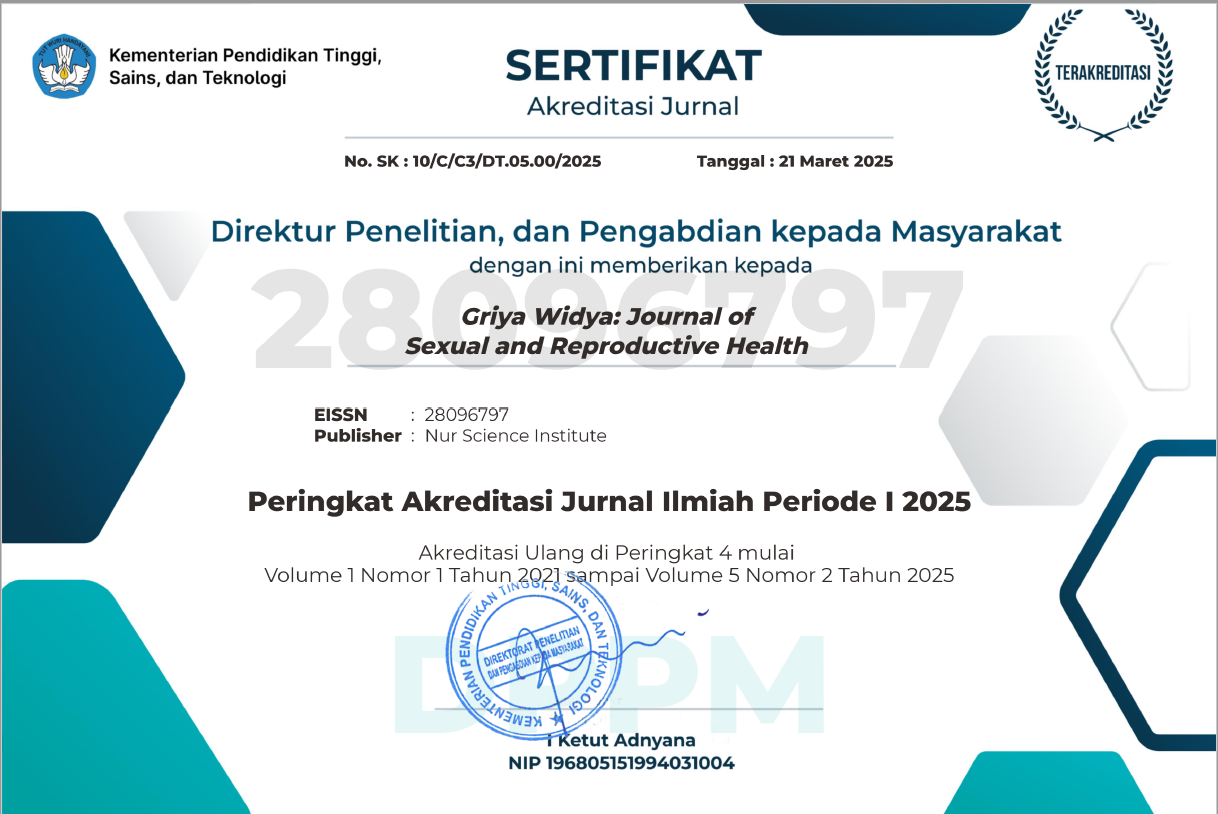Bimbingan Islam dalam Menumbuhkan Kepercayaan Diri Penyintas HIV/AIDS
DOI:
https://doi.org/10.53088/griyawidya.v2i2.659Keywords:
Islamic Guidance, Self Confidence, HIV/AIDSAbstract
Purpose: The purpose of this study is how the implementation of Islamic guidance in fostering self-confidence of HIV / AIDS survivors at PKBI Semarang City.
Method: This type of research is field research with a phenomenological approach. Data was obtained using observation method, interview method, documentation method. The data that has been collected is analyzed by the stages of data reduction, data display and data verification / conclusion drawing.
Result: The results showed that the implementation of Islamic guidance in fostering self-confidence of HIV/AIDS survivors in PKBI Semarang City focuses in three steps, namely planning, implementation and evaluation. Planning is done by the supervisor by making preparations to help make it easier to carry out Islamic guidance. Implementation is done by providing Islamic guidance material related to monotheism, sharia or moral worship with spiritual material programs, psychological, social guidance, which emphasizes individual and group approaches through lecture, question and answer, discussion, experiment demonstration, habituation, out bond and motivational training based on efforts to increase self-resilience and self-confidence of HIV / AIDS survivors by promoting motivation to always get closer to Allah through repentance, patience, effort and tawakkal so that HIV / AIDS survivors feel close to Allah SWT and able to live their lives with confidence. Evaluation is always carried out to control how far the absorption ability of HIV / AIDS survivors and assess the behavior of HIV/ AIDS survivors after implementing Islamic guidance
References
Bandura, A. (2007). Self-Efficacy: The Exercise of Control. New York: Freeman and Company
Dzaky, A. (2012). Konseling dan Psikoterapi Islam. Yogyakarta: Fajar Pustaka Baru
Kirana, R. (2022). Analisis Pengetahuan Remaja Dengan Kejadian HIV-AIDS pada Remaja. Jurnal Inovasi Kajian, 3(7), 7003-7006. https://doi.org/10.47492/jip.v3i7.2206
Hallen. (2011). Bimbingan Dan Konseling Dalam Islam. Jakarta: Ciputat Pres.
Lunenburg, F. C. (2011). Self-Efficacy in the Workplace: Implications for Motivation and Performance. International Journal of Management, Business, and Administration, 14(1), 1-6
Maghfiroh, T. D. (2020). Kepatuhan Minum AntiRetroviral (ARV) pada Ibu dengan HIV Positif Di LSM Victory Plus Kota Yogyakarta Tahun 2020. Skripsi, Poltekkes Kemenkes Yogyakarta.
Mahfudh, S. (2004). Solusi Problematika Aktual Hukum Islam Keputusan Muktamar, Munas, Kon Bes NU 1926-1999. Surabaya: LTN NU Jawa Timur Dan Diantama
Mukhid, A. (2009). Self-efficacy (Perspektif Teori Kognitif Sosial dan Implikasinya terhadap Pendidikan). TADRIS: Jurnal Pendidikan Islam, 4(1). https://doi.org/10.19105/tjpi.v4i1.247
Musnamar, T. (2012). Dasar-Dasar Konseptual Bimbingan dan Konseling Islami. Yogyakarta: UII Press
Nawawi, H., & Martini H. (2016). Instrumen Kajian Bidang Sosial. Yogyakarta: Gajah Mada University Press
Schunk, D. H., & Hanson, A. R. (2015). Peer Model: Influence on Children’s Self Efficacy and Achievement. Journal of Educational Psychology
Shaleh, A. R (2008). Psikologi: Suatu Pengantar Dalam Perspektif Islam. Jakarta: Kencana.
Siegle, D., & McCoach, D. B. (2007). Increasing Student Mathematics Self-Efficacy through Teacher Training. Journal of advanced Academics, 18(2), 278-312. https://doi.org/10.4219/jaa-2007-353
Styana, Z.D., Nurkhasanah, Y. & Hidayanti, E. (2016). Bimbingan Rohani Islam dalam Menumbuhkan Respon Spiritual Adaptif bagi Pasien Stroke di Rumah Sakit Islam Jakarta Cempaka Putih. Jurnal Ilmu Dakwah, 36(1), 45-46
Syaqiq, M. (2022). Upaya Pencegahan dan Penanggulangan Penyebaran Penyakit Infeksi Menular Seksual Masa Pandemi COVID-19 di Kabupaten Batang. Journal Publicuho, 5(3), 929-945. https://doi.org/10.35817/publicuho.v5i3.36
.
Downloads
Published
How to Cite
Issue
Section
License
Copyright (c) 2023 Nur Ikha Wijayanto, Sholihan, & Widayat Mintarsih

This work is licensed under a Creative Commons Attribution-ShareAlike 4.0 International License.
Authors who publish with this journal agree to the following terms:
The author(s) retain copyright and grant the journal the right of first publication with the work simultaneously licensed under a CC BY-SA 4.0 license that allows others to remix, adapt, and build upon the work even for commercial purposes, as long as they credit the author(s) and license their new creations under the identical terms.
License details: https://creativecommons.org/licenses/by-sa/4.0/



